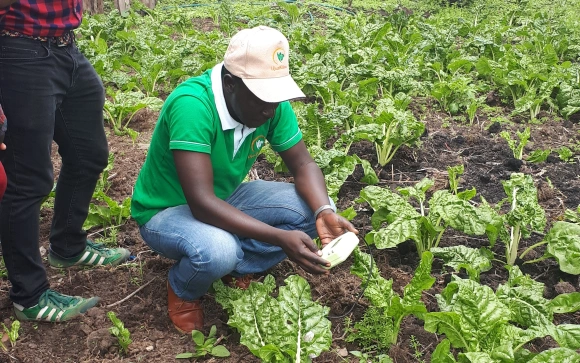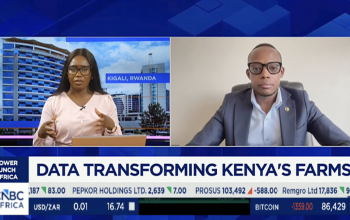This article was first published in The Economist Intelligence Unit Food sustainability Index.
Across the African continent, smallholder farmers contribute significantly to food security in their countries, accounting for the majority of the food consumed. However, the desire to produce more food on less land has resulted in these farmers transitioning into unsustainable farming practices that have affected the soils. This calls for innovative solutions and models to improve access to knowledge and information. Data and digitisation hold the key to success, argues Brian Bosire, Kenyan innovator, thinker and entrepreneur.
The need for innovative solutions
Already 40% of African soils are degraded. The rate of replenishing the soils has been low compared with the nutrient uptake. More pressure is expected from the need to feed 2bn additional people across the world in the next three decades. This calls for innovative solutions and models to improve access to knowledge and information for these smallholder farmers in order to help them to move away from destructive farming practices towards more sustainable, productive agriculture. By improving knowledge dissemination to farmers, we increase their ability to be economically viable, make better decisions and reduce production risks. It’s by knowledge-driven farming that we can effectively counter the effects of the changing climate, depleting soils and diminishing farm lands.
Africa is home to great examples of innovative and knowledge-driven best practices, as highlighted by the Food Sustainability Index (FSI), developed by The Economist Intelligence Unit with the Barilla Center for Food & Nutrition Foundation. Rwanda is the top-performing low-income country in the index, with solid performances across the FSI’s three pillars (nutritional challenges, sustainable agriculture, and food loss and waste). The report accompanying the latest FSI results highlights best practices in sustainable agriculture such as the Connected Farmer Alliance in Kenya, Mozambique and Tanzania, using mobile technology to connect farmers to multinational agribusinesses; SunCulture’s solar-powered irrigation technology used by smallholder farmers in Kenya; and the farmer-to-farmer digital network provided by Wefarm that connects about 1m African farmers, who can ask each other questions and receive crowd-sourced answers in minutes via text message.
Data as the driver
It’s virtually impossible for any industry to develop without the right datasets to guide the digitisation path. In the context of agriculture, data will have a similar or an even greater impact on revolutionising agriculture than what tractors did during the process of agricultural mechanisation. Like the farming tools that accompanied us through agrarian history, data are the current tool that will push agriculture to the new frontier by fundamentally cutting the cost of delivery, logistics, knowledge and best practice. This alone means that data will be key in transforming farmers into champions of sustainability and productivity.
Digital technologies are able to track and control things remotely and share ideas and knowledge everywhere. Delivering services like agricultural extension—training that would require a lot of people to walk far to train farmers on the new and better ways to deal with a crop pest outbreak or livestock—can now be done on a single platform powered by data, sensors and artificial intelligence to customise agricultural advisory to farmers in a remote village. This involves activities such as watching useful videos on best practices, understanding and tracking market dynamics and weather to inform the suitable fertiliser application time, and preventing wastage and leaching.
Adopting a technology-driven approach to disseminate the right information, knowledge and best practices to smallholder farmers can be leveraged by tapping into the African mobile phone revolution.
Data can be used to democratise access to services, quality inputs and better-yielding varieties for farmers. Through data, most of the smallholder farmers that are still left out of the conventional value chains, distribution, financing and even training will have access to fully unlocked, data-driven and digitised processes that transcend physical and cost barriers.
Focus on small farms
Around 60% of the world’s uncultivated arable land is in Africa, which has over 33m smallholder farms. The future we are building for agriculture will be focusing on these micro farms rather than large farms. For the past three decades smallholder farmers have relied on gut instinct and inherited knowledge to make decisions on the food they produce. Technology advances over the past three decades have exponentially gone beyond the comprehension of the majority of smallholder farmers.
Digital technologies can bridge the gap, providing a better and faster means of delivering services and monitoring progress. Digitisation has given us the power to deliver better yields that consume less water. This can be coupled with flexible payments for inputs and equipment like solar-powered irrigation kits for farmers who previously relied on expensive and wasteful irrigation systems.
Farmers can now access a package of micro-financing, insurance and guaranteed markets for their produce, and use blockchain to promote transparency and conscious consumption, offering incentives to farmers who produce sustainably while promoting environmental wellbeing.
Whereas Africa has lagged behind in previous agricultural technology advancements, the continent is leapfrogging into Agriculture 4.0, which offers us the sweetest spot to reinvent our production. Smallholders need to leapfrog the old extractive and wasteful agricultural practices towards precision data-driven agriculture that’s more inclusive—because without smallholders, our food systems won’t work.
—
Brian Bosire, founder and CEO, UjuziKilimo and Hydrologistics Africa; UN Young Leader for the Sustainable Development Goals; member of the World Bank Youth Advisory group.
ABOUT THE AUTHOR
Brian Bosire is the founder and CEO of UjuziKilimo, which develops technologies that modernise African farming to help small-scale farmers practice precision farming and access quality, actionable agricultural data for improved productivity. He is also the founder of Hydrologistics Africa (HydroIQ), which improves water distribution and consumption using sensors and data analytics. He is a UN Young Leader for the Sustainable Development Goals and has won numerous global awards and recognition for his contributions to digital technologies in Africa.



